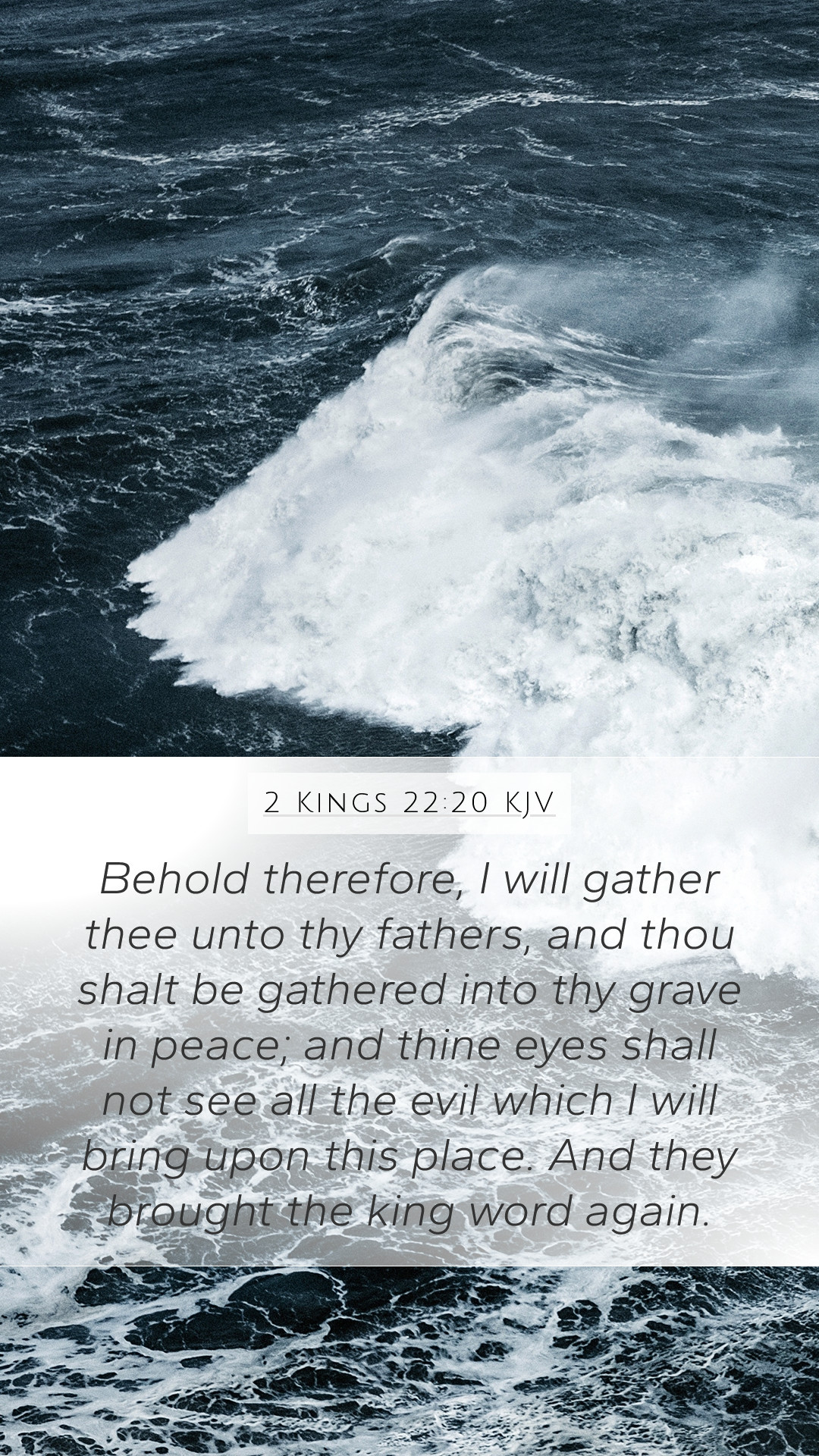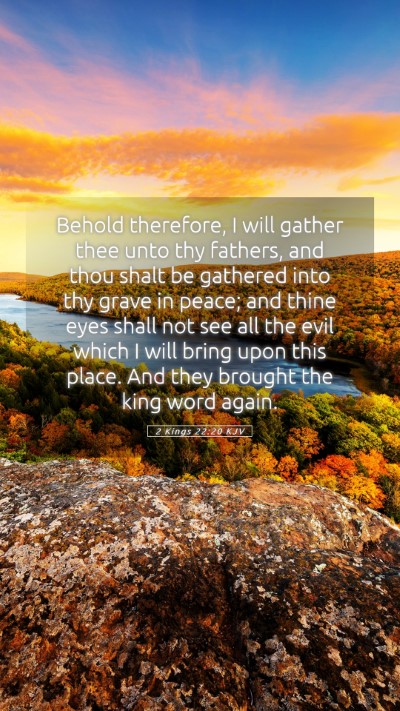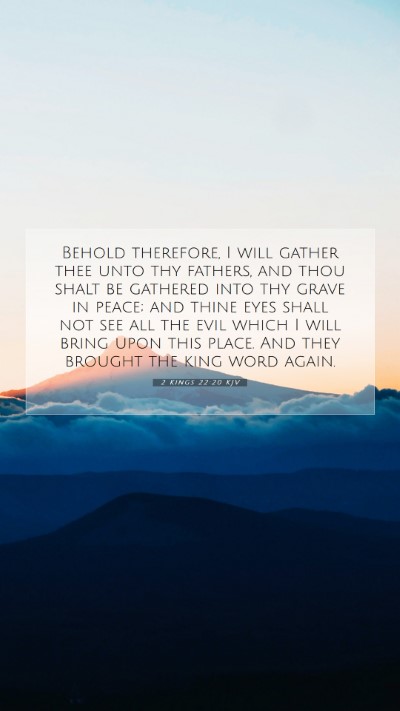Old Testament
Genesis Exodus Leviticus Numbers Deuteronomy Joshua Judges Ruth 1 Samuel 2 Samuel 1 Kings 2 Kings 1 Chronicles 2 Chronicles Ezra Nehemiah Esther Job Psalms Proverbs Ecclesiastes Song of Solomon Isaiah Jeremiah Lamentations Ezekiel Daniel Hosea Joel Amos Obadiah Jonah Micah Nahum Habakkuk Zephaniah Haggai Zechariah Malachi2 Kings 22:20 Meaning
What is the meaning of 2 Kings 22:20?
Behold therefore, I will gather thee unto thy fathers, and thou shalt be gathered into thy grave in peace; and thine eyes shall not see all the evil which I will bring upon this place. And they brought the king word again.
2 Kings 22:20 Bible Verse Meaning
Understanding 2 Kings 22:20
The verse 2 Kings 22:20 states: "Therefore, I will gather you to your ancestors, and you will be buried in peace. Your eyes will not see all the disaster I am going to bring on this place.” This is the assurance given to King Josiah.
Bible Verse Commentary
Contextual Overview: This verse occurs within a significant moment in the reign of King Josiah of Judah, a time characterized by major religious reform and rediscovery of the Law of the Lord. In this chapter, we see God's communication to King Josiah through the high priest Hilkiah following the discovery of the Book of the Law. The context is essential in grasping the full meaning of this verse.
- Historical Significance: King Josiah's reign was marked by a return to true worship and destruction of idolatry in Judah. This verse reflects God's mercy amidst impending judgment on the nation due to its deep-seated unfaithfulness.
- Mercy and Judgment: The assurance to Josiah indicates that even though judgment is coming, God acknowledges Josiah’s earnestness in seeking Him and His Law.
- Promise of Peace: The promise of being "buried in peace" signifies Josiah's departure from this world will come before the calamity that would befall Judah, suggesting God’s grace amid judgment.
Bible Verse Meanings and Interpretations
Matthew Henry's Commentary: Henry indicates that Josiah's faithful reforms rendered him a unique individual amidst a nation of disarray. Despite the inevitable doom on Judah, the divine compassion towards Josiah reflects God's relationship with His faithful servants. His death would be a peaceful one and a testament to God’s favor.
Albert Barnes' Commentary: Barnes explores how Josiah’s reforms influenced God's decision to grant him a peaceful death. It shows that God often spares the righteous from the consequences of a nation's collective sin, highlighting mercy intertwined with justice.
Adam Clarke's Commentary: Clarke emphasizes the prophetic nature of this pronouncement. He interprets that God acknowledged Josiah’s genuine heart and repentance and was willing to ensure that judgment would come later, underlining the hope for those faithfully serving God amidst widespread unfaithfulness.
Application of 2 Kings 22:20
This verse can serve as a touchstone for various personal applications, such as:
- Encouragement to Faithful Servants: Those who strive to live righteously can take comfort in knowing that God recognizes their efforts and promises peace even amidst widespread turmoil.
- Understanding God's Timing: This verse teaches us that God’s judgment can be delayed in mercy, showcasing His divine patience and love for those who pursue righteousness.
- Prayer and Repentance: It also highlights the importance of seeking a relationship with God through earnest prayer and repentance, especially when we see the consequences of sin in our surroundings.
Connecting 2 Kings 22:20 to Other Scriptures
It is beneficial to reflect on related scriptural passages that enrich the understanding of this verse:
- 2 Chronicles 34:27: Reflects God’s response to Josiah’s humble and contrite heart.
- Jeremiah 22:10: Provides context of mourning for the deaths of leaders and the implications of judgment.
- Psalm 37:37: Encourages observing the upright and the blameless, promising that the end of such people is peace.
In-depth Bible Verse Analysis
The analysis of 2 Kings 22:20 through the aforementioned commentaries gives us insights into God's character - a God who balances justice with mercy, particularly towards those who genuinely seek Him. Understanding that Josiah's actions — his fears and reforms — were not in vain underlines an essential truth in biblical interpretation regarding God's recognition of righteous living.
This passage invites believers to consider how their own faithfulness may impact their lives and their communities, reinforcing the need for Biblical exegesis in today’s context. It also emphasizes the importance of approaching Bible study through tools that help in highlighting verses' meanings and interpreting difficult passages.


